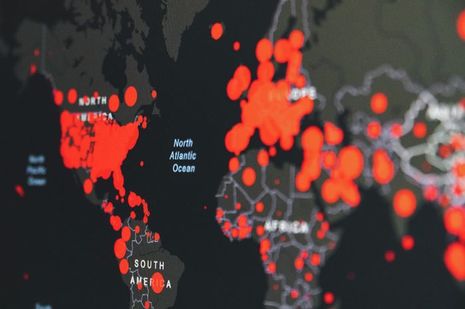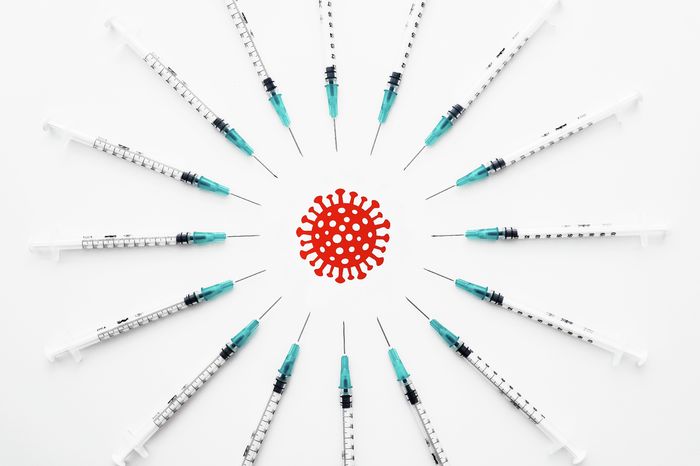Neocolonialism and the politics of Omicron in South Africa
With the Omicron variant rapidly spreading across the globe, Eric Williams returns to the nation where the variant was identified, arguing that South Africa’s complex history of colonialism and apartheid has weakened its pandemic response

Driven by the Omicron variant’s high transmissibility, South Africa has entered its fourth wave of COVID-19 infections. As economic, public health, and political crises merge, the persistent legacy of apartheid and colonialism has much to answer for in a country that has reached over 230,000 excess deaths.
Last November, in response to South African scientists’ identification of the variant, countries in the Global North imposed travel restrictions on the region. The EU, US, UK and other major economies targeted southern African countries, many of which had not recorded any Omicron cases, whilst Western countries, where the variant had been detected, remained free from travel prohibitions. South African President Cyril Ramaphosa denounced these measures as “punishing African excellence”. Against such restrictions, the country’s tourism industry suffered as it entered its busiest months, a major blow to the much-needed recovery after last year, when over 300,000 lost their jobs in the sector. With an economy characterized by inequality and high unemployment, South Africa is especially vulnerable to these discriminatory policies.
“South Africa’s political economy has its roots in colonialism and apartheid”
South Africa’s political economy has its roots in colonialism and apartheid. The extraction of mineral resources by mining conglomerates for the benefit of imperial capital and the nation’s white settler elite is a defining feature of the country’s history. Super-profits were made possible by the exploitation of low-wage black labour, cheapened by the dispossession and displacement of the peasantry into native reserves where livelihoods were partially maintained by subsistence agriculture. This trend was codified in the 1913 Natives’ Land Act, where 87% of land was designated to white minority ownership, with the African population confined to ‘Bantustans’. Widespread poverty and unemployment existing alongside great wealth, generated by mining companies like Anglo-American, has afflicted South Africa ever since. Unfortunately, even with the remarkable success of the African National Congress’ liberation struggle and the transition from apartheid to democracy in 1994, this fundamental structure of the South African economy has remained unaltered.
The ruling party since 1994, the African National Congress (ANC), has historically relied on a tripartite alliance with the Communist Party (SACP) and the Congress of South African Trade Unions (COSATU). Whilst the Mandela government’s initial adoption of the Reconstruction and Development Programme partially attempted to implement the promises of economic and social transformation laid out in the liberation movement’s Freedom Charter, as the ANC continued to wield power the party moved away from its radical tradition. Under Mbeki, the Growth, Employment and Redistribution program enacted World Bank-endorsed fiscal discipline, relaxation of capital flow regulations and privatisation of state utilities; unemployment soared to 30% by the early 2000s.
“The global pandemic response has demonstrated more clearly than ever that imperialism, far from a thing of the past, remains a significant force in shaping international politics”
Like democratization in Latin America, political liberation has failed to shake the colonial foundations at the core of South Africa’s political economy, leaving the population especially susceptible to the present crises. Although Mbeki’s Black Economic Empowerment policy elevated a small class of African elite, gross inequality in land distribution inherited from apartheid was left essentially unchanged. Indeed, the very organizations that once acted as the national vehicle for social justice have been warped beyond recognition by the lack of a corresponding economic liberation. Alienated by austerity, COSATU and the SACP backed outcast Jacob Zuma against Mbeki, a Faustian bargain which backfired in a decade of authoritarianism, state capture by oligarchs, and attacks on the labour movement, including the 2012 police shooting of 34 miners at Marikana. The tripartite alliance has disintegrated, epitomised in the expulsion of the militant National Union of Metalworkers from COSATU in 2014, and the ANC’s unprecedented fall to below 50% in elections last month is the culmination of the liberation movement’s failure to challenge the wide-ranging legacy of colonialism in the post-apartheid era. In this period of international crisis, the outcome of the last thirty years has been laid bare, as external actors have exercised arbitrary power over South Africa with dire consequences for the country’s people.
In the past two years, the global pandemic response has demonstrated more clearly than ever that imperialism, far from a thing of the past, remains a significant force in shaping international politics. For over a year, as millions died from the virus, the wealthiest members of the WTO, including the UK, blocked South Africa and India’s proposal of a TRIPS waiver. The requested suspension of patents would have facilitated local production of vaccines, therapeutics, and diagnostics in developing countries. Instead, the failure of the Covax scheme has left the African continent with a vaccination rate of only 7.5%, a crime that Ramaphosa has criticized as “vaccine apartheid”.
Whilst Ramaphosa’s strong stance against vaccine inequality is a welcome development, like previous ANC governments, his administration has not addressed underlying structural conditions inherited from apartheid. Worth $450 million and familiar with sitting on advisory boards of international corporations such as Coca-Cola and Unilever, Ramaphosa is far removed from his liberation struggle union days and was implicated in the Marikana massacre when sitting on the board of Lonmin platinum mine. Despite an expanded unemployment rate of 44%, Finance Minister Godongwana’s recent budget resisted calls to increase welfare spending and introduce a basic income grant, opting instead for fiscal austerity.
As South Africa’s hospitals continue to fill and an economic crisis envelops the country, the conduct of many wealthy countries in the Global North has remained in line with their colonial past. The legacy of imperialism and apartheid must be comprehensively targeted by an economic and social transformation; challenging the international order and entrenched capital interests is a necessity.
 News / Deborah Prentice overtaken as highest-paid Russell Group VC2 February 2026
News / Deborah Prentice overtaken as highest-paid Russell Group VC2 February 2026 News / Christ’s announces toned-down ‘soirée’ in place of May Ball3 February 2026
News / Christ’s announces toned-down ‘soirée’ in place of May Ball3 February 2026 Fashion / A guide to Cambridge’s second-hand scene2 February 2026
Fashion / A guide to Cambridge’s second-hand scene2 February 2026 News / Downing Bar dodges college takeover31 January 2026
News / Downing Bar dodges college takeover31 January 2026 Comment / Men at Cambridge are experiencing equality2 February 2026
Comment / Men at Cambridge are experiencing equality2 February 2026











